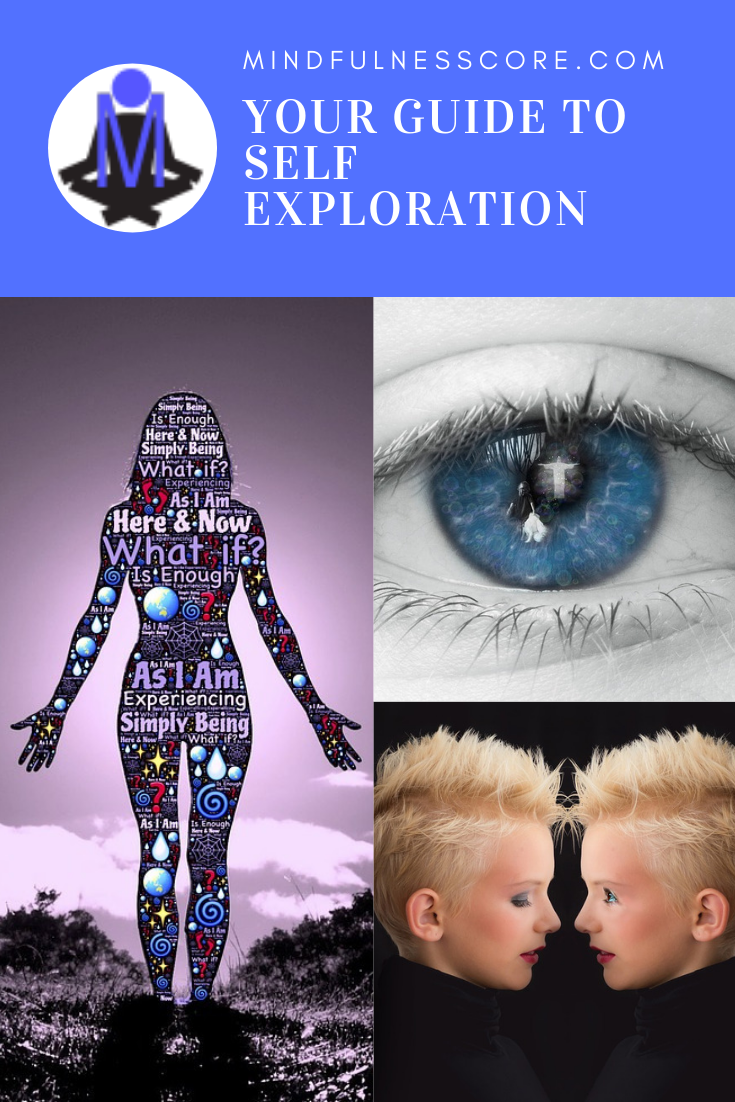Your Guide For Self Exploration To Know Yourself Better

If you are in search of wisdom, your search should start with the desire to know yourself. It is highly unlikely that “knowing yourself” is a novel concept for you since the majority of us keep on talking about it without actually knowing what it means and what essence does it hold. Even today, if someone was to come to you and ask what do you exactly mean when you support the importance of knowing yourself, what is it that a person should know in order to satisfy the desire of “knowing oneself”, it’ll be reasonably hard for you to answer it with precision.
Make a simple search on Google and you would be overwhelmed of the results highlighting the tips and strategies that you can use to get to know yourself better but what’s unfortunate is that the rambling articles and blogs would still not tell you what is it that you are in search of? How can you use the strategies that they mention without having an in-depth understanding of what is it that you want to know about yourself in the first place?
Taking that into consideration, we have taken the liberty of giving you a different perspective about self-exploration. Instead of stating the obvious tips to use for self-exploration, we have taken a different approach to inform you about the constituents of “knowing yourself”. Once you have the answer to what you need to know about yourself in order to understand yourself better, you can employ a wide range of tips and tricks available on the internet to accomplish the goal.
Have you ever heard of the “VITALS”? While it’s a concept used mostly in healthcare, you must be familiar with what it means since it is fairly general as well. What if I told you that your VITALS are essentially what informs you about the person that you are. But wait, no, the VITALS we are referring to are not the ones used in Healthcare. It is actually an acronym of Values, Interests, Temperament, Around the clock, life goals, and strengths. These are the six primary components of self-exploration.
1. What Values Do I Have?
In an attempt to know yourself better, the first question that you should ask yourself should be about your values. Simply put, your values are the driving force for almost all of your decisions. Think about it, don’t we use our values as motivators to make all of our decisions? Some would make their life decisions based on a desire to help others. Here’s a leading value that is facilitating their decisions. Others would probably use their desire to be creative while finalizing their decisions. Here’s a different value, but one that is serving the same purpose. If you evaluate your own decisions, yours probably are based on your desire to be healthy or financially secure. Hence, the first step for self-exploration is to evaluate your values because that informs you of the force that usually drives your life decisions.
Start with sitting yourself in a calm and peaceful environment with a piece of paper and a pen. Ask yourself a question about your values and make a list of all that you can think of. It’s all right there in your subconscious. You just haven’t ever given it a chance to come out that has created a barricade for yourself in knowing yourself better. Now that you are taking some time out to explore your values, your journey for self-exploration has begun. As per psychology, just knowing your values is highly effective in improving your capability of making healthy decisions.
2. What Am I Interested In?
Once you know your values, it is time for you to focus on your interests. For a better idea, you can think of your interests as your hobbies or things that you feel passionate about. Whatever it is that has the potential to keep your attention for a reasonable amount of time falls under the category of your interests. The good news is that evaluating your interests isn’t as hard as you would think. It’s all about investing your time into it. As in the case of values, all you have to do is find a calm and peaceful environment where you can sit quietly with yourself. A few of the simples questions which can shed some light on what you feel interested in includes and are not confined to the following:
- What is it that I subconsciously pay attention to?
- What is it that makes me curious and inspires me to know more about it?
- What is it that is usually a matter of concern for me?
The importance of knowing and understanding your interests is unparalleled. It informs you about the things that you are passionate about and highlights the kind of life that you desire to live. Once you have a deeper understanding of your interests, you are in a much better position to make the right decision about choosing a line of work. For instance, you might have chosen healthcare for academia but you find yourself passionate about writing. Putting an effort into realizing your passion will enable you to blend the two and choose a career in healthcare blogging instead. All in all, having knowledge about your interests presents a clearer picture of what is it that you want to do in your life.
3. How Does My Temperament Define My Preferences?
Did you know that it is your temperament that [restrict] defines your inherent preferences which in turn shape your entire personality? Any random personality test that you can find on the internet primarily focuses on evaluating your temperament and your preferences to provide details of your personality. For instance, are you the kind of person who feels more comfortable and refreshed while being alone or are you the one who wants social interactions and an adventure with the friends and your family to recharge your batteries? In other words, would you label yourself as an introvert or an extrovert? Similarly, it is your temperament that informs you about the basis of your decisions. Are they driven more by the facts and the information at your disposal, or do your feelings play a defining role in making decisions? Similarly, you can ask yourself if you prefer to do go with the flow or is it in your veins to plan ahead of time of pretty much everything.
It is important to recognize your temperament, preferences, and your entire personality in general since it enables you to understand the kind of environment, situations, and circumstances which are likely to support your growth and progress. For instance, if you are well aware that spontaneity is not your cup of tea, you can make sure to set some time aside for planning every step of your life to minimize the probability of failure and increasing the likelihood of your success.
4. When Do I Partake In Activities Around The Clock?
Now comes the role of understanding your biorhythms. Believe it or not, all of us have innate clocks installed in our bodies which make us partake in activities at a specific time. For self-exploration purposes, it is imperative that you thoroughly analyze your biorhythms. This can help in providing valuable information like whether or not you are a morning person. It further informs you about the time of the day when you usually find your energy at its absolute peak. How many hours of sleep is optimum for your mind and your body to recharge their batteries.
The knowledge of such information is of the essence since it determines the productivity and creativity that you’d be able to present on a day to day basis. For instance, if there is a crucial task at hand that has to be performed with perfection, and you are well aware of the fact that your energy and mental capacities are at their optimum during the early hours of the day, you have a rational explanation of why you should undertake the task in the morning. Not only would you be able to perform it with efficiency at this time, but you would also be able to use the best of your creativity and productivity to be flawless in terms of its delivery.
5. What Is My Life Goal?
Here comes a component of self-exploration that is perhaps the most obvious of them all. You don’t know anything at all about yourself if you are not sure of what goal is it that you are in pursuit of? Remember that the life goal that is being referred to here is not the ultimate goal that you want to accomplish. If you think about it, through each phase of your life, there is a specific goal in your mind that you wish to achieve. For instance, in the days of your prime youth, your goal would have been to get a degree and find a job. Afterward, your goal would have been to settle down and start a life. Later in the years, it would have been your goal to be able to provide for your family and maintain their standard of life.
Hence, through each phase of our lives, having a goal in front of our eyes is of utmost importance as it is the goal that gives meaning to your life and everything that happens within. This also facilitates your decision making since you are aware of your destination. You can then put an effort into aligning your decisions in a fashion that they support your journey to the destination.
6. What Are My Strengths?
Lastly, an important component of self-exploration is to make a thorough SWOT analysis of yourself. This is perhaps the most time consuming of all the constituents but investing your time into it is totally worthwhile since the information you extract out of it is applicable for the success of your personal and professional life in the long run. Performing a SWOT analysis of your self enables you to see the things that you are good at as well as others which need improvements. It further informs you of the resources available to you and the opportunities that you can seize, as well as the barricades that you are likely to face as you pace towards achieving your life goals. The SWOT analysis of yourself gives you an opportunity to polish your strengths, work on your weakness to minimize them as much as you can, evaluate your resources to see how you can get the most out of what is available to you, and to plan ahead of time for the hurdles that you are likely to face. Remember, for self-exploration, the SWOT is not confined to your abilities, the talents that you have, or the skills that you have learned. It focuses on the features of your character as well such as those of emotional intelligence, loyalty, respect and love for humanity, a desire to be fair in your dealings, your self-esteem, etc.
Final Words
Now that you have gone through the detailed information that we have mentioned about self-exploration, the next time someone asks you what does “knowing yourself” comprise of, you would no longer have to be blank or offer a vague answer. These are the six primary components, the knowledge of which determine how well do you know yourself. It is to be kept in mind that self-exploration has been associated with happiness and self-control, as per psychology. The better you know the person that you are, the lesser are your chances of being in conflict with yourself and the more likely are you to make the healthier decisions. It sets you free from pressures of society and transforms you into a person who is able to understand the people as well. Considering that you don’t need anything other than a bit of your time, a peaceful environment, a piece of paper, and a pen, don’t you think it’s worth a shot? What do you have to lose anyway? [/restrict]

